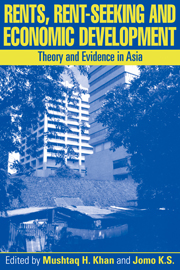Book contents
- Frontmatter
- Contents
- List of Figures
- List of Tables
- List of Contributors
- Acknowledgements
- List of Abbreviations
- Introduction
- 1 Rents, Efficiency and Growth
- 2 Rent-seeking as Process
- 3 Rent-seeking and Economic Development in Thailand
- 4 Thailand's Old Bureaucratic Polity and Its New Semi-democracy
- 5 Obstructive Corruption: The Politics of Privilege in the Philippines
- 6 Funny Money: Fiscal Policy, Rent-seeking and Economic Performance in Indonesia
- 7 The Malaysian Development Dilemma
- 8 Financial Sector Rents in Malaysia
- Index
2 - Rent-seeking as Process
Published online by Cambridge University Press: 05 March 2012
- Frontmatter
- Contents
- List of Figures
- List of Tables
- List of Contributors
- Acknowledgements
- List of Abbreviations
- Introduction
- 1 Rents, Efficiency and Growth
- 2 Rent-seeking as Process
- 3 Rent-seeking and Economic Development in Thailand
- 4 Thailand's Old Bureaucratic Polity and Its New Semi-democracy
- 5 Obstructive Corruption: The Politics of Privilege in the Philippines
- 6 Funny Money: Fiscal Policy, Rent-seeking and Economic Performance in Indonesia
- 7 The Malaysian Development Dilemma
- 8 Financial Sector Rents in Malaysia
- Index
Summary
So far in our analysis of rents, we have looked only at the implications of the rents themselves and not at the implications of the processes through which rents are created or maintained. In fact, since rents are, by definition, beneficial for the recipients, they are likely to spend resources to create, maintain or transfer particular rents. Rent-seeking is the expenditure of resources and effort in creating, maintaining or transferring rents. These expenditures can be legal, as with most forms of lobbying, queuing, or contributions to political parties. But they can also be illegal, as in the case of bribes, illegal political contributions, expenditures on private mafias, and so on. The processes are of tremendous significance because the resources they use up are a social cost, and they determine the types of rents which are created and maintained in a particular society.
Conventional rent-seeking theory, however, assumes that rent-seeking only results in the creation or protection of monopoly rents, and, in addition, it makes restrictive assumptions about how the rent-seeking cost is determined. Nevertheless, the contribution of this theory was to tell us that the cost of rent-seeking was an additional cost of maintaining a monopoly. However, the conventional rent-seeking framework has to be radically extended if it is to be relevant for the real world. Institutional economics and political economy both suggest directions in which the rent-seeking framework can be extended.
- Type
- Chapter
- Information
- Rents, Rent-Seeking and Economic DevelopmentTheory and Evidence in Asia, pp. 70 - 144Publisher: Cambridge University PressPrint publication year: 2000
- 52
- Cited by



